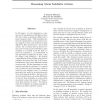Free Online Productivity Tools
i2Speak
i2Symbol
i2OCR
iTex2Img
iWeb2Print
iWeb2Shot
i2Type
iPdf2Split
iPdf2Merge
i2Bopomofo
i2Arabic
i2Style
i2Image
i2PDF
iLatex2Rtf
Sci2ools
103
click to vote
KR
1992
Springer
1992
Springer
Reasoning About Indefinite Actions
In this paper, we view planning as a special case of reasoning about indefinite actions. We treat actions as predicates defined over a linear temporal order. This formalism permits the representation of concurrent activpose we have a set of abstract actions defined by Horn clauses from a set of basic actions. Let us assume that an abstract action has occurred, and ask whether a given condition is entailed by all the basic actions that constitute . A countermodel to this hypothetical implication is then a plan for "doing and avoiding ." We propose a formalization of this problem using circumscription, and argue that this is the correct formalization if our action definitions include recursive rules. We then investigate two techniques for solving the problem: (1) a special type of inductive proof procedure, which is sound but not complete; and (2) a decision procedure that works for an interesting subclass of the general problem. Because of the use of recursive rules in our...
Related Content
| Added | 10 Aug 2010 |
| Updated | 10 Aug 2010 |
| Type | Conference |
| Year | 1992 |
| Where | KR |
| Authors | L. Thorne McCarty, Ron van der Meyden |
Comments (0)

